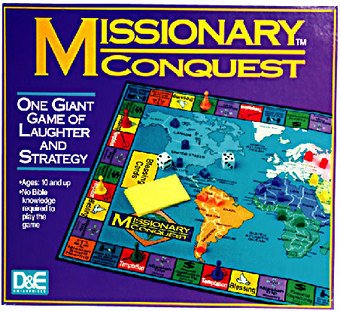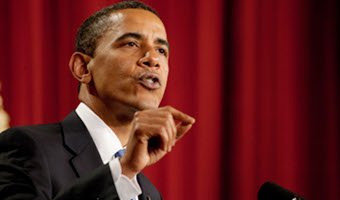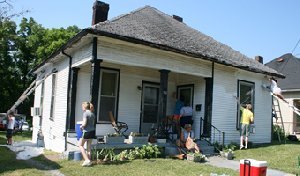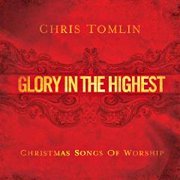Christmas in the United States is both a secular and sacred holiday. There’s the hustle and bustle of shopping, parties and family gatherings, and for Christians, it is perhaps the holiest time of the year.
Sometimes that creates conflict between businesses that, for commercial reasons, prefer inclusive holiday greetings over “Merry Christmas” and devout shoppers, who insist that “Jesus is the reason for the season.”
When it comes to observing Christmas, Baptists in the United States can benefit from comparing notes with Baptists in other countries.
So, we contacted well-known and respected Baptist leaders around the world and asked them three questions:
• What is the significance of Christmas in your society?
• In what distinctive ways do Baptists celebrate Christmas?
• What is your favorite thing about Christmas in your country?
Their responses follow. We are deeply grateful to all who contributed, and hope our readers find their submissions both educational and inspirational.
El Salvador
Mauricio Vargas has lived in the United States about 20 years but has family in El Salvador and visits three or four times a year. Recently, he visited the San Vicente region devastated by floods and mudslides associated with Hurricane Ida. While there, he participated in a memorial service for seven children and two adult members of First Baptist Church in San Vicente who died in the tragedy. He has retired as multicultural director for the Missouri Baptist Convention but works part-time as coordinator of the convention’s partnership in El Salvador, which is scheduled to end in two years. He also works part-time as multicultural specialist for Concord Baptist Association in Jefferson City, Mo.
What is the significance of Christmas in El Salvador’s society?
In a word, the coming of Jesus Christ. In a Catholic society, the celebration of Christ’s coming starts early in December with the Posadas—a nine-day festival Dec. 16-24 symbolizing the journey to Bethlehem before Jesus’ birth. Mary and Joseph travel the streets of our city, looking for a place to rest for a night. The following day, they travel to another home and wait for the baby to be born.
People sing praises during the walks, and many times at the end of the journey, families celebrated with drinks and candies.
In what distinctive ways do Baptist churches in El Salvador celebrate Christmas?
I remember well the coming of Christmas because the church began to prepare music, poems and different prayers where children and youth participated. I still remember some of those poems that my teacher asked me to learn. We prepared to celebrate Dec. 24 in the evening service. Our parents provided us with new clothing for the special occasion. After the service, we had tamales and hot chocolate. For me, the best part was that the people from our mission points came to spend the night with us at the church. It was an extended church family celebration.
What is your favorite thing about Christmas in El Salvador?
When I was growing up, my sisters were in a Baptist college in Santa Ana. I really looked forward to seeing them coming home. Our church was the center of activities in December, and we really enjoyed being part of the Christmas plays and music. We did not receive many toys, but we always had some home cooking that my mother did, like special turkey and sweet tamales. Family has been important to me, so to see all my three sisters and two brothers was a celebration that we still have as family.
Australia
Rod Benson is an ethicist and public theologian with the Tinsley Institute based at Morling College in Sydney, Australia. He is a former church planter and pastor. He is married with three sons and attends Dural Baptist Church
What is the significance of Christmas in Australian society?
Australia lies south of the equator, and Christmas falls in the middle of summer. The weather can be sweltering, there is often bush fire smoke in the air, and winter Christmas traditions seem strangely out of place. Yet most Australians persevere with the traditional trappings of the festive season.
Although secularists and multiculturalists have tried to abolish public expressions of the Christian tradition of Christmas in Australia, in recent years there has been plenty of evidence that Jesus is the reason for the season. Nativity scenes appear in shopping malls, homes are adorned with Christmas lights, people say “Happy Christmas” to one another, and there are nationally televised Christmas concerts featuring traditional carols and an implicit evocation of the biblical incarnation narrative.
In what distinctive ways do Baptist churches in Australia celebrate Christmas?
For Australian Baptists, Christmas is a time for spiritual formation, outreach and community service. For example, Small Boat Big Sea, an innovative missional community based on Sydney’s northern beaches, kicked off Advent with a labyrinth service, and the next two Sunday services will address different aspects of waiting on Jesus.
Blakehurst Baptist Church, a Sydney suburban church, will host a “stations of Christmas” event where participants walk from house to house as elements of the Christmas story are presented in drama and song.
Kenmore Baptist Church, a large Brisbane church, presented a contemporary version of the Christmas story set to adapted lyrics from pop songs such as “I’m All Shook Up” and “Graceland,” emphasizing God’s gracious intervention in human history to save us.
Dural Baptist Church, of which I am a member, has a range of Christmas activities, including three fund-raising projects. We will help develop Futsal, a small-court soccer program, in Solomon Islands, building a stronger sense of community through sport. Dural introduced Futsal to the Solomons in 2001.
We also will contribute to a Baptist World Aid Australia capacity building project in Solomon Islands focused on employment, HIV/AIDS education and teacher training. And we will support a Baptist World Aid Australia project in Cambodia, providing microfinance to help people disabled by landmines to achieve economic independence.
Away from church, there also are opportunities for meaningful outreach. A friend of mine directs an antenatal ward in a major Sydney hospital, and this Christmas commissioned a series of scenes from children’s stories for the hospital—The Lion, the Witch and the Wardrobe, The Wind in the Willows and Little Women.
What is your favorite thing about Christmas in Australia?
What I love most about Christmas, apart from the delicious rest and food, is a fresh awareness of the depth and extravagance of God’s love, and the reminder that with God the impossible becomes history. Christmas never fails to deliver.
Germany

Klaus Rösler and his daughter, Marie.
|
Klaus Rösler, 52, works as an editor for various Christian magazines and press services, including the European Baptist Press Service, a department of the European Baptist Federation.
What is the significance of Christmas in German society?
In German society, Christmas is above all a feast for the family and a feast of peace. It involves two holidays (the 25th and the 26th). The reason behind Christmas—that Jesus, the Son of God, came to earth—has largely been forgotten.
Nevertheless, the Christmas services in Lutheran and Catholic churches have the highest annual attendance by far. It’s a long-time tradition for many to go to church at Christ-mas—but never otherwise. For trade and commerce, Christmas is—of course—vital, for it is the time when we give each other gifts. Twenty percent of a store’s business is done only during November and December. On toys, it amounts to 30 percent. The Christmas rush begins in grocery stores as early as September, when chocolate and gingerbread Santas begin to appear on the shelves.
In December, Germany’s cities and villages are blanketed by thousands of lights, which exude a romantic atmosphere. Every town has a Christmas market consisting of small stalls smelling of hot wine punch (Glühwein), bratwurst and holiday pastries. And most German households will have a Christmas tree, which are to be more expensive this year than ever before. Last year, a yard-high tree cost roughly $30 U.S.
In what distinctive ways do Baptist churches in Germany celebrate Christmas?
This question is tough to answer, for one cannot speak of “the Baptists” in Germany. We support a broad range of theological convictions with very different ways of expressing faith.
Some congregations use Christmas as a time for evangelistic campaigns. Becoming increasingly popular are “living mangers,” in which the Christmas story is portrayed by real people. Before Christmas, youth groups and church choirs sing in homes for the elderly and hospitals.
The biggest event of all is Christmas Eve. Then, choirs and orchestras perform with additional manger games and activities for children. Baptist services also are well attended on Christmas Eve, though there usually are not many more in attendance than for other services. As a rule, during the course of an entire year, Baptist congregations are better-attended than Lutheran or Catholic ones.
Many Baptist congregations have no services whatever on the 25th and 26th. Other congregations hold special events for singles. Christmas being a family feast leaves not a few people lonely. Such persons are then invited to visit a Baptist congregation. Other congregations offer special events for the homeless and itinerate.
What is your favorite thing about Christmas in Germany?
Christmas is important to me as a celebration for the family. We have a seriously-handicapped or impaired daughter, Marie, age 16. She suffered cerebral bleeding 11 years ago and has been in a coma and living in a children’s care center ever since. The remaining family visits her every year at Christmas—that is, her older sister Lara, 19, we as the parents and often also the grandparents. We sing Christmas songs for her, take her for a walk in her wheelchair and play games. We often have the impression Marie notices that her family is there, and she is glad about that. That is then a very special present for us, for which we are very thankful to God.
Zimbabwe
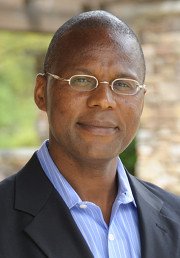
Isaac Mwase
|
Isaac Mwase is currently a cancer prevention fellow with the NIH National Cancer Institute in Bethesda, Md. Previously, he taught at Tuskegee University and Ouachita Baptist University. A native of Zimbabwe, Mwase was a pastor and editor there before coming to the United States. He earned a bachelor’s degree at Gardner-Webb University and master’s and a doctorate from Southwestern Baptist Theological Seminary. He returned to his homeland as a visiting instructor at the Baptist Theological Seminary of Zimbabwe in the summer of 1992.
What is the significance of Christmas in Zimbabwe’s society?
Zimbabwe’s society is just as diverse as other societies. For Christians, Christmas was a time when I was reminded—and as a young preacher, I participated in the reminding of others—to put Christ back into Christmas. I remember gathering at a church or at the Baptist conference center to celebrate Christ’s coming into the world as our Lord and Savior. We prayed a lot. We were part of all night prayer meetings. Other Christmases and for many outside the church, it was a time to get a new set of clothing and shoes, a time to eat the bird for special occasions—free range chicken. The cold Fantas, sparkling lemon, ginger beer and Coca-Cola sodas pleasured our palates to no end.
In what distinctive ways do Baptist churches in Zimbabwe celebrate Christmas?
It just occurred to me that I have not been in Zimbabwe for Christmas since 1983. Back then, we spent Christmases at the Baptist camp in Gweru—the young people, that is. In Dotson/Nyathi Hall, named after the first Southern Baptist missionary and the first national Baptist pastor, we would seek to draw closer to God through energetic choruses and fire-and-brimstone preaching. Sometimes we would spend the whole night in prayers.
What is your favorite memory about Christmas in Zimbabwe?
The abundance of food and cold sodas in just about every home, even those known to be populated by the working poor and the willingness to share these simple pleasures of life with whoever showed up. Christmas allowed us to experience an abundant life of sorts. The sharing and caring was heavenly.
Canada

Lois Mitchell
|
Lois Mitchell is justice initiatives coordinator for Canadian Baptist Ministries, a national partnership of four Baptist conventions and unions serving more than 1,000 Baptist congregations and 250,000 people who worship across Canada in 32 languages.
What is the significance of Christmas in Canadian society?
Canada is an intentionally and proudly multicultural and pluralistic society. Religious freedom is unambiguously embedded in the Canadian Charter of Rights and Freedoms. However, many Canadian Christians feel increasingly marginalized by the political correctness of inclusion and diversity.
In recent years, it has become inconsiderate and a breach of multiculturalism to use time-honored and traditional Christmas language. Thus, for example, it’s more acceptable to say “Happy Holidays” or “Seasons Greetings” than “Merry Christmas.” Similarly, a “Christmas Tree” is now a “Holiday Tree,” and Christmas music is a mix of traditional carols and an increasing array of non-Christian songs of cheer. Nativity scenes are generally not welcome in public places, although they’re fine in private homes or in churches.
The Christmas season, though enthusiastically celebrated, has been thoroughly secularized. It’s all about shopping and gift giving, culinary indulgence, festive adornments—both inside and out—and shifting the emphasis from busyness as usual, to busyness with an added social emphasis with family, friends and co-workers.
In spite of the individualism of our society and our time, there remains a spirit of “good will”—communities of all sizes and political persuasion find creative ways to encourage charitable giving for the sake of the “less fortunate among us.”
The Christmas season begins for many in mid-November and extends into the New Year. As Christmas Day approaches, there is an expectation that families will spend the holiday together, but with the dramatic increase in the rate of family breakdown in Canada, this is more and more challenging. Cards are still exchanged, but more and more people resort to digital communication, sending greetings and family updates by e-mail.
In what distinctive ways do Baptist churches in Canada celebrate Christmas?
Perhaps because of the excessive commercialization of Christmas in secular society and the efforts to neutralize the Christian message of the season, Baptists in Canada seem to be making efforts to reclaim the holiday. While gift giving still is practiced, there has been a real shift toward giving to the poor and marginalized, both locally and globally. More and more churches are involved in compassionate ministries in their own communities and, through the proliferation of gift-giving options for overseas projects through Christian charities, many Baptists now give a significant portion of their personal gift-giving budgets in the form of donations to these organizations.
Traditions such as Christmas concerts and musicals and special Christmas Eve services still play a prominent role in many—perhaps most—Baptist churches in Canada. There also seems to be a renewed interest—especially in small towns and rural areas—in caroling in the neighborhood—going from house to house and singing Christmas carols, especially to those who are shut-ins.
What is your favorite thing about Christmas in Canada?
My favorite thing about Christmas in Canada is the general sense of goodwill that permeates both secular society and the church. Despite the commercialization—and maybe in a weird way partly because of it—that is, when shopping produces an artificial “high” that causes a short-term elevation of mood—there seems to be a deep sense of community and care for one another. For a few weeks, an emphasis on peace and goodwill pierces through the otherwise callous drive for self-fulfilment and personal prosperity.
Great Britain

Mark Woods
|
Mark Woods is editor of The Baptist Times, a weekly newspaper associated with the Baptist Union of Great Britain.
What is the significance of Christmas in the United Kingdom?
Christmas in the United Kingdom is dominated by commercial interests, as it is everywhere in the developed world. It sometimes seems that there’s a race between retailers to see who can get their Christmas merchandise and decorations up soonest; it seems to have crept back as far as late November nowadays, and the widespread irritation this causes still doesn’t stop them doing it.
Like many European countries, the church in the U.K. is swimming against a secularist tide, quite a lot of it very aggressive and vocal. A popular book this year is The Atheist’s Guide to Christmas. And generally, church attendance at Christmas seems to be declining, though it’s still much higher than at other times. Interestingly, attendance at our great cathedrals has risen consistently year by year.
Churches and parachurch agencies make a concerted effort at this time to reach out to people who don’t normally attend. This year there’s a national ad campaign using billboards and bus shelters, for in-stance, and many churches will carry out their own neighborhood invitation programs as well. We try to make sure that services are seeker-friendly, with mixture of welcome and challenge.
Many churches would have a Carols by Candlelight service, where the old favorites are sung. Some would have midnight communions. Often, the young people will visit elderly members of the congregation or local care homes to sing for them. And many churches will have an outward-looking focus, caring for homeless people or inviting people without families of their own to meals.
On Christmas Day itself, children often are invited to bring one of their gifts to church and show it to the congregation. The service will be short, probably around 45 minutes, and include lots of singing and a short address.
What is your favorite thing about Christmas in the United Kingdom?
As a pastor, I prepared literally hundreds of Christmas messages over the years. But I never found that the old story grew stale, or that I ran out of things to say about what that quintessentially English poet, John Betjeman, said about “that most tremendous tale of all”—“that God was man in Palestine/And lives today in bread and wine.”
Korea
Billy Kim is pastor emeritus of Suwon Central Baptist Church in South Korea and the first Asian to serve as president of the Baptist World Alliance, a position he held from 2000 to 2005.
What is the significance of Christmas in Korean society?
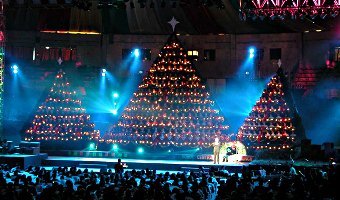
“The Best Gift from God,” a musical drama portraying the birth of Christ, was the premier performance of “The Living Christmas Tree” in Korea in 2004.
|
Christmas is called “Sung-Tan-Jul” in Korean.
Korea’s Christmas began at the beginning of the 20th century. It was introduced in Korea by the Christian missionaries from Western countries, and for many years, the only people who celebrated it were those who had turned to the Christian faith. But now, Christmas becomes one of a few holidays that are celebrated in Korea, and not only Christians are enjoying this holiday, but also non-Christians.
Many Western customs in observing Christmas have been adopted by Koreans. Besides exchanging gifts, they decorate their houses with colorful lights and ornaments, and in some places there are even community Christmas trees. During the holiday season, the Salvation Army rings the bells in front of their red kettles, as well.
One of common traditions to Korea is ‘‘Christmas cakes.’’ Generally, people buy the cakes and light candles to celebrate Christmas. Artists and entertainers run Christmas-related shows and Christmas-themed performances.
Most churches will have their own special Christmas worship service on Christmas morning and on Christmas Eve, too. Lots of church activities are going on Christmas season, including children’s night, volunteering work and music program like Christmas cantatas and choir concerts.
Indeed, Korea’s Christmas customs are similar to other, Western, countries. However, there is no special meal for Christmas in Korea.
In what distinctive ways do Baptist churches in your country celebrate Christmas?
There is no particular distinctiveness among Christian denominations in Korea.
What is your favorite thing about Christmas in your country?
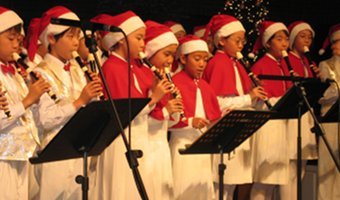
Korean orchestra celebrates Christmas.
|
Christmas, especially in Korea, has become associated with love and mercy, so that people usually take good care of the poor, especially during this season.
Poland
Daniël Trusiewicz of Poland oversees the European Baptist Federation’s Indigenous Missionaries Project, an effort to facilitate evangelism and planting new Baptist churches in Europe, the Middle East and Central Asia.
What is the significance of Christmas in Polish society?
Christmas is preceded by the four weeks of Advent. The culmination of Advent is Christmas Eve. Families gather around the festal table for a special meal. The food can be served only when the first star can be visible in the sky. People start this meal by breaking a wafer bread—a piece of flat and white bread—and exchanging good wishes. It is also important to be reconciled with each other.
After that, people eat a semi-vegetarian meal composed of several dishes. A red beetroot soup, dumplings filled with cabbage, different types of fish, fruit drink and poppy seeds cake would be particularly popular. Meat is not allowed on that night. One place at the Christmas Eve table must be free for a potential guest. This is a symbol of hospitality and openness to an invisible presence of the One who once was rejected when he came to this earth from heaven.
After the meal, people sing carols and give gifts to each other. All gifts are laid at a Christmas tree, and children always wait impatiently for the moment of unwrapping them. This is practiced in order to remember that God had sent his Son as the gift to humankind. At midnight, the Roman Catholics attend a Christmas Mass.
In what distinctive ways do Baptist churches in Poland celebrate Christmas?

Daniël Trusiewicz (center), who oversees the European Baptist Federation’s Indigenous Missionaries Project, enjoys a Christmas dinner with his family
|
Baptists would practice the same rituals as Catholics, except for the midnight Mass.
Most of Baptist churches would have a family service with children singing carols, reciting poems or acting the Nativity stories according to the Bible. Children often get gifts in churches that are prepared by Sunday schools. Sermons during Christmas would be based on the stories about birth of the Savior, and carols would be sung in churches.
What is your favorite thing about Christmas in Poland?
I personally like that Christmas is a family reunion. People try to be reconciled for this occasion and are even more friendly than usual. I think it is really important that Christmas can be celebrated, because it reminds us of the Savior who became man so that sinners may have eternal life.
Russia
William Yoder is media spokesperson and liaison to the English- and German-speaking communities in the external relations department of the Russian Union of Evangelical Christians-Baptists.
What is the significance of Christmas in Russian society?

William Yoder, who works with the Russian Union of Evangelical Christians-Baptists, enjoys family time with his wife, Galina, and their granddaughter, Isabella.
|
Russians are only now relearning Christmas. There was no official Christmas holiday in Russia between 1925 and 1992. Its reintroduction also is greatly hampered by the fact that Christmas, the New Year and usually also Easter need to be celebrated twice. Lenin adopted the Western, Gregorian calendar—introduced in 1582—in 1918, but the Orthodox Church continues to celebrate by the Julian one, which presently has Dec. 25 falling on what the Western calendar regards as Jan. 7. Presently, the Julian calendar—introduced in 45 B.C.—is 13 days behind the Gregorian one.
As a consequence of the Soviet era, New Year’s—the Gregorian, worldwide one—remains the biggest celebration of the year. Dec. 25 is not an official holiday in Russia, and most Russian celebration occurs in the first two weeks of January. Add that the Russia economy grinds to a halt between the days of the New Years (Jan. 1) and the “Old New Years” celebrations on Jan. 14.
In what distinctive ways do Baptist churches in Russia celebrate Christmas?
The churches of Western origin, which remain primarily the homes of ethnic minorities—the Catholics, Lutherans and Mennonites, for example—celebrate almost exclusively on Dec. 25. Others, like the Baptists, who stress their Russianness, celebrate twice. How Baptists manage the calendar spaghetti is dependent upon the creativity of the local Baptist leadership. A friend reports that in his Baptist church, the last hours before midnight on both Dec. 24 and Dec. 31 are spent in church on one’s knees in prayer.
In his Baptist congregation, the family celebration occurs on the evening of the 24th, and the year’s most special church service occurs on the 25th. Baptists often use Jan. 7 as an opportunity to evangelize, attempting to invite persons off the street to attend a church event that day. Caroling is done on the street on the evening of Dec. 24 or Jan. 6. This occurred even during the late Soviet period, but the caroling was done on-the-move without remaining at one location in order to minimize difficulties with the authorities.
What is your favorite thing about Christmas in Russia?
Christmas gifts remain modest in Russia; there is no month-long shopping spree to speak of. Advent, the last four Sundays prior to Christmas, also is rarely commemorated. But there are gifts for Baptist children on the evening of the 24th, and this is indeed the most special time of the year for the vast majority of Baptist children and their parents.
The evening of Jan. 6 is a terrific time for Baptists like me to visit an Orthodox church. It’s their version of an all-night hymn sing: The candles glow and the drawn-out, almost sad and highly melodious music of the Orthodox tradition reverberates until late in the morning hours. Indeed, the same occurs at Orthodox Easter.
Italy
Anna Maffei is president of the Christian Evangelical Baptist Union of Italy, which includes 116 churches and a total of 6,200 members.
What is the significance of Christmas in Italian society?
Christmas is the feast of the family in Italy. It is felt very much as the occasion for the extended family to meet together starting from the evening of Dec. 24. Special meals are prepared and shared. There is exchange of gifts and visiting. Before Christmas, one tries to reach the highest number of relatives and friends by phone or mail to exchange information and wishes.
In our country, which is massively and culturally a Catholic country, even those who never attend the Mass may choose to attend a special Mass, either on Dec. 24—the midnight Mass—or on Dec. 25.
Of course, before Christmas there is a lot of shopping going on, the same as it happens everywhere in the Western world.
In what distinctive ways do Baptist churches in Italy celebrate Christmas?
The Baptists celebrate Christmas in a similar way as the others but concentrate more on the Christian meaning of the feast. It is not only a family reunion holiday, but also a community feast when we try to welcome the lonely people or immigrants and be family for them. We may eat together, for instance, or play together a special Christmas play. Christmas is also the children feast and many churches organize plays on nativity or other subjects in which to engage mainly children. In many churches choirs sing gospel songs and carols.
What is your favorite thing about Christmas in Italy?
The atmosphere, the warmth of the family, the celebration of being together and the good food!

